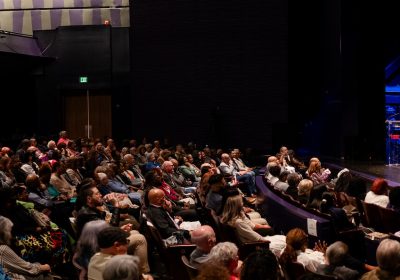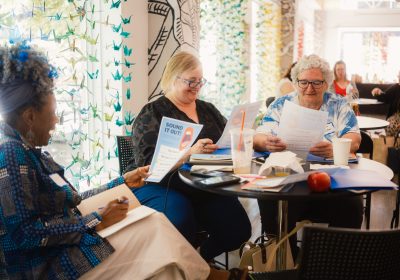By Karen Price
At PA Humanities, the humanities are so much more than subjects to be studied at school or concepts to be debated by academics. We believe the humanities are powerful tools that can spark civic engagement, build community, educate, inspire, and make long-lasting change.
It’s no wonder that 50 years after our founding, we still are working hard to ensure that Pennsylvanians have access without barriers to the humanities and the tools to lead change in their communities. The original mission of the Committee for the Humanities in Pennsylvania – or HIP, as the group of founding volunteers referred to themselves – was to give everyday people the opportunity to connect, better understand current issues, and take positive actions using the insights of the humanities.
“I was struck as I spoke to founders of HIP and explored archives at the National Endowment for the Humanities how visionary and innovative the work of the public humanities was at state humanities councils in Pennsylvania — back then and now,” PA Humanities executive director Laurie Zierer said. “In 1973, we were a grand experiment for the public good, blazing a new trail to increase appreciation for the humanities – all with the help of content experts. We have continued to re-envision that journey at PA Humanities, focusing strategically on areas of need in Pennsylvania where the humanities can have the greatest impact: community building and education. More than anything else, our belief today that everyday people have the know-how and talent to make a difference in our communities, has redefined us — and modeled a new path for the field — of how the humanities must be people-centered and led by communities rather than content-focused or expert-led.”

As we celebrate our 50th anniversary, we wanted to look more closely at the 14 grants HIP awarded during the first two years of its existence. They all focused on the theme, “The People of Pennsylvania and Their Institutions: Who Does What?,” which resulted from surveys and queries of citizens across the state to learn what mattered most to them. It was designed “for the people of Pennsylvania to examine how they and their institutions can develop and foster individual respect, personal security and justice in the neighborhoods and communities of the Commonwealth.”
HIP members believed the theme would help to encourage citizens and academics to come together to explore issues of alienation, isolation and the responsibilities of the people, create imaginative approaches to discussions on the development of human dignity and justice in a mass society, and elicit unique perspectives that would help “the general adult public to move from an insular view to a wider view and thus to an understanding of self and society in the long historical continuum.”
Here’s a look at the projects that received the most attention from local media.
Flooding
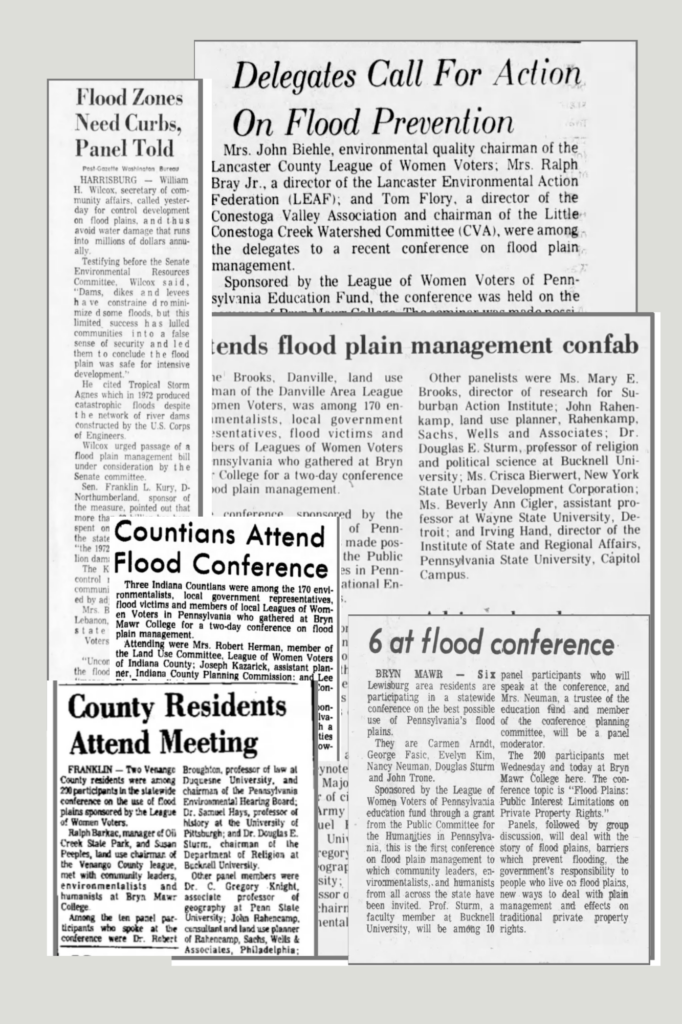
One issue weighing heavily on the minds of commonwealth citizens was flooding.
Hurricane Agnes hit Pennsylvania in June 1972 and was the worst natural disaster in the state’s history. It caused over $2.1 billion in damage, left 220,000 homeless and led to 48 deaths as floodwaters ravaged communities across north and central Pennsylvania. Some towns were left two-thirds underwater by flood waters, which reached more than 10 feet high in some areas. Crops and livelihoods were destroyed. Recovery took months; some homes didn’t see electricity restored for 103 days.
As a result, the League of Women Voters of Pennsylvania was awarded funding in the amount of $14,850 for a project entitled “Flood Plains: Public Interest on Private Property Rights.” It was held at Bryn Mawr College on the second anniversary of the flood.
In its report to the National Endowment for the Humanities, HIP wrote this of the program:
“The state-wide conference on the humanistic values often overlooked in the issue of flood plain management deals with a vital concern for many Pennsylvania communities. …The conference sponsor, the League of Women Voters Education Fund, expects that humanists from history, philosophy, political science, and jurisprudence will help participants to gain a perspective of the total picture of the problems historically, ethically, legally. Against this background the conflict of individual rights and common good may be more rationally interpreted.”
The conference garnered attention in newspapers across the state. Dr. Miriam Ershkowitz, assistant professor of political science at Temple University, gave the keynote address, and panelists included a law professor from Duquesne University in Pittsburgh, a professor of history at the University of Pittsburgh, and the chairman of the Department of Religion at Bucknell.

The Oil City Derrick reported, “The panels were followed by group discussion… centered around the possibility of using legislation to bring about better [flood plain] management, with attendees charged with returning to their communities and sharing what they learned at the conference.”
Other reports noted that, “The states need policies, the conferees decided, which deal humanely with flood victims and property owners on flood plains.”
HIP helped Pennsylvanians grapple with recovery from disastrous flooding in the 1970s, and in 2021 PA Humanities distributed $1.4 million in funding from the National Endowment for the Humanities to aid in growth and recovery from the COVID-19 pandemic.
Land use
Another topic that generated a lot of press was land use. Elizabethtown College, located southeast of Harrisburg, received $3,560 to produce a project called, “The Impact of Modern Technological and Environmental Change Upon the Rural Conservative Cultures of S. Eastern Pennsylvania.” It was described as three open community forums to discuss the impact of modern technology and change on the area, with particular emphasis on land utilization, value systems and lifestyle, and population, with a discussion led by humanists from the college staff, representatives of several conservative cultures, and representatives from industrial and commercial interests.
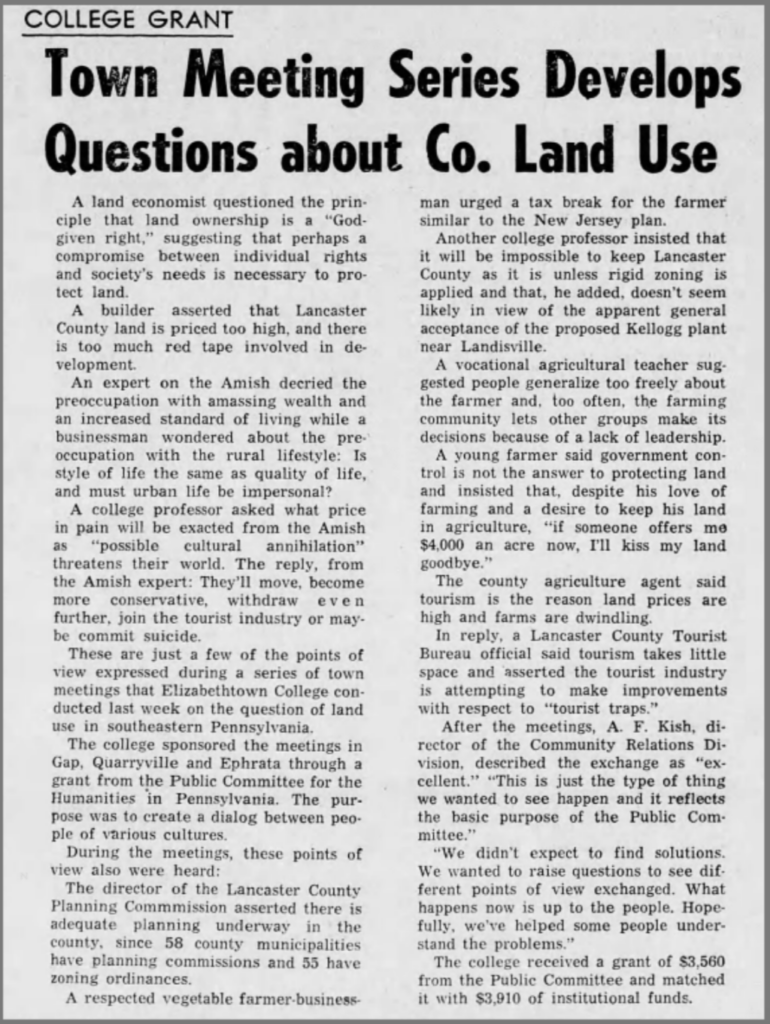
The Lancaster New Era in March 1974 reported on the upcoming second of three meetings, during which panelists would discuss the questions, “Are we utilizing our land properly?”, “Does the use of the land affect the way we live?” and, “Should we retain the rural heritage in the face of population pressures and modern technology?” The paper went on to say, “The college hopes the presentations and the informal reaction will produce a free-wheeling discussion in town-meeting style among those present.”
The Elizabethtown Chronicle covered one of the meetings and reported on the views and thoughts shared by people including a land use economist, a builder, an expert on the Amish, a respected vegetable farmer and businessman, a young farmer, a vocational agricultural teacher and several professors. A.F. Kish, director of the community relations division at Elizabethtown College, said the meetings reflected the basic purpose of HIP.
“We didn’t expect to find solutions,” Kish said. “We wanted to raise questions to find different points of view exchanged. What happens now is up to the people. Hopefully, we’ve helped some people understand the problems.”
Much like members of the community came together to discuss land use, value systems and lifestyle, and protecting their town’s heritage in the 1970s, PA Heart & Soul communities now foster similar discussions as residents envision the future they want.
Public assistance
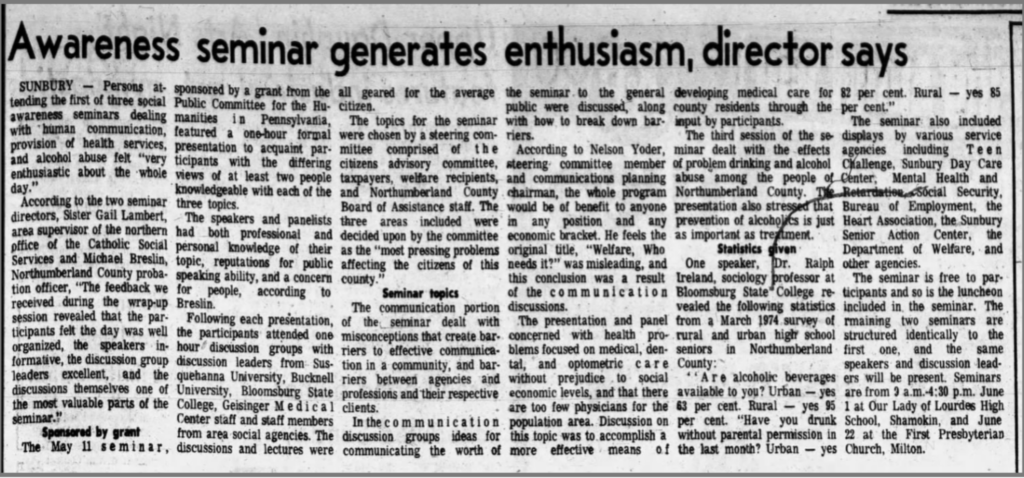
Yet another project that was heavily publicized in its area was sponsored by the Citizens Advisory Board to the Northumberland County Board of Assistance. HIP funded $6,814 for a project entitled, “Welfare – Who Needs it?”, which consisted of three one-day seminars to discuss pressing social issues (human communication barriers, health services, problem drinking) in relation to human needs and services in the principal Northumberland County communities.
In its report to the NEH, HIP wrote, “The project will use the perspectives of the humanities to place the issue of welfare in the context of social and distributive justice in an attempt to overcome the pejorative connotations of the word ‘welfare’ by enabling the community to understand the historical and philosophical development of the social mechanisms for insuring an equitable existence for all individuals.”
Insuring an equitable existence for all individuals is still a foundation of PA Humanities’ work. We center equity in our people, culture, community and impact, including the programs and organizations we fund and with whom we partner.
Pittsburgh’s home rule
Back in 1974, voters in Pittsburgh were debating the merits of the home rule charter. The measure was designed to “allow the city of Pittsburgh to operate without having to go to the state legislature in Harrisburg to get permission for actions not expressly forbidden by state law or the Constitution and create a more flexible, efficient and responsible government,” and up for vote in the November election. To help residents make an informed decision, the Government Study Commission of Pittsburgh and Pittsburgh League of Women Voters proposed and were granted $9,600 to lead “A Program of Public Discussion on the Suggested New Home Rule Charter for Pittsburgh.”

A headline in the May 30, 1974 issue of the Pittsburgh Post-Gazette read, “City Pushes Information Blitz on Home Rule Charter Issue,” and the article began, “The City Government Study Commission is taking every precaution to to assure that the information vacuum that plagued Allegheny County’s ill-fated home rule charter becomes an information blitz for Pittsburgh’s charter proposal.”
HIP wrote:
“The project in Pittsburgh is an ambitious venture that can be the model of the state-based program in an actual setting. From May to November a series of meetings, discussions and television and radio presentations will feature humanists, citizens and political leaders in non-partisan exploration of the implications of the proposed new city charter for Pittsburgh. The questions, ranging from the nature of authority and citizen participation in the democratic process to establishing governmental structures congruent to the needs of developing metropolitan life, have been developed by a panel of humanists. They and other humanists will be central to the implementation of the project, which will help citizens understand more deeply the implications of their choice in the November referendum on the charter.”
The measure was ultimately approved by the electorate.
In 2022, PA Humanities fostered civic engagement and leadership in the state’s young people with its special project, If You Were In the Room. That exploration and examination of the US Constitution continued with 2023’s podcast series, Re-Vision.
As we continue to celebrate our 50th anniversary at PA Humanities throughout the next several months, we’ll feature more looks back at some of our programs and history. Stay tuned!

![[color – dark bg] PA SHARP FINAL FILES DB 72dpi [color - dark bg] PA SHARP FINAL FILES DB 72dpi](https://pahumanities.org/uploads/files/elementor/thumbs/color-dark-bg-PA-SHARP-FINAL-FILES-DB-72dpi-phgl7aimtfdpzt2rscvl43ksfv3asbbls19lsvuacw.jpg)

